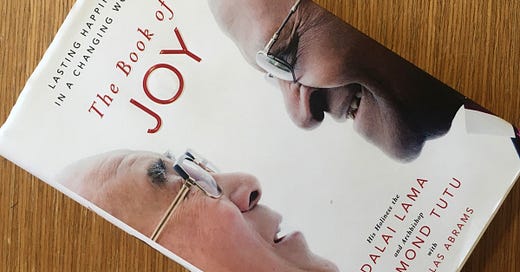Maybe it’s just me, but when I am frustrated about certain things, everything near me is vulnerable. Given enough time and stewing, frustration can irrationally turn into anger. Hopefully the victim of my wrath is some inanimate object like a tool that’s not perfect, but all too often it’s a person who’s not perfect. And then with rare exception, that pointing finger makes an appropriate one-eighty. Turning frustration into anger toward anyone might be common, but it’s counterproductive at best and rarely helpful.
One of the most salient findings for me in this book was: “The first Noble Truth of Buddhism - life is filled with suffering” . . . the Sanskrit word for suffering is “dukkha.” It is sometimes described as the “stress and anxiety that arise from the attempt to control what is fundamentally imperfect and unable to be controlled. . . which leads to frustration and anger.”
My head understands the concept that truly happy and well-adjusted people don’t get sucked into the blame game - they are problem solvers, not problem generators. This book provides one more nudge toward my heart internalizing that message.
THE BOOK OF JOY was written by Douglas Abrams, but is saturated with the words and spirit of two long-time friends and fellow exiles. The first is a Buddhist monk, the 14th Dalai Lama, and the second an Anglican bishop, Desmond Tutu. Both were winners of the Nobel Peace Prize who had turned decades of oppression and violence into lives of sacrifice and hope. Archbishop Desmond Tutu who famously said: “I refuse to go to a homophobic heaven,” crossed that threshold December 26, 2021 at the age of ninety. My hunch is that he didn’t have to do any kicking or screaming.
A Few Gleanings
The Book of Joy was not the light-hearted, almost frivolous book I feared it might be. In fact, as I was coming off a joy-threatening addiction to news, I was enlightened as to all of the obstacles to joy I’ve been immersed in. Fear not, however, those obstacles are equal opportunity downers, even for those without addictions. This book is a serious exploration of that which we could all use more of. Not surprisingly, that “Joy”, is incompatible with the “ Us Against Them” paradigm that currently hangs, like a death star, over our planet.
As the discussions in the book were oftentimes between two old friends and octogenarians, huge life-sized questions came up. “What is the purpose of life?” Most fundamentally, the Dalai Lama and Desmond Tutu agreed that it was simply to find happiness and minimize suffering. I’ll be the first to admit, I was looking for something a bit more profound.
The authors were quick to make distinctions between happiness and joy - although they blended together at times. JOY is much larger, more pervasive, and enduring than happiness. It is not subject to the weather or the winds per se.
Happiness, as opposed to joy, tends to be more fleeting and is so often linked with sensory pleasures. We hear beautiful music, have a great meal, encounter a wonderful local IPA, or see a beautiful sunrise - we are Happy! Maybe we get a new car, a new motorcycle, or the deck we’ve always wanted. We’re happy for a few days, maybe even months, but that excitement fades. Somehow, wanting more of something, is usually right around the corner.
An old Buddhist saying sums this up quite well - “ Trying to seek happiness through sensory gratification is like trying to quench your thirst by drinking saltwater.”
Now let’s imagine, we’re holding a loved one’s hand while standing in the middle of a thousand acre field, under a dome of a million stars. Why is it so awe-inspiring - could it be that we’ve just made a connection with something way bigger than ourselves - maybe divine mystery, or dare I admit it, God? Though these experiences are certainly marked with sensory pleasures, there’s something else going on here. I think it’s the essence of JOY!
“Nothing Beautiful Comes Without Suffering”
I hesitate to give such a small amount of attention to the subject of suffering. It is a common theme and critical part of any serious discussion of Joy. Allow me to quote just one example here.
“While the racist apartheid government in South Africa imprisoned Nelson Mandela and so many other political leaders, the Archbishop became the de facto ambassador of the anti-apartheid struggle. Protected by his Anglican robes and the Nobel Prize that he received in 1984, he was able to campaign for an end to the oppression of blacks and other people of color in South Africa. During that bloody struggle he buried countless men, women, and children, and tirelessly preached peace and forgiveness at their funerals.
After the release of Nelson Mandela and his election as the first president of a free South Africa, the Archbishop was asked to create the famed Truth and Reconciliation Commission to try to find a peaceful way to confront the atrocities of apartheid and pioneer a new future without revenge and retribution.”
With the above as context, the Archbishop made reference to it, ‘it is how we face all of the things that seem to be negative in our lives that determines the kind of person we become.”






https://youtu.be/zSt7k_q_qRU Brother David Steindl-Rast, a contemporary of Tutu and the Dalai Lama, wrote the classic “Gratefulness, The Heart of Prayer”. He contrasts happiness, which “happens”, with joy, which emerges out of pain.